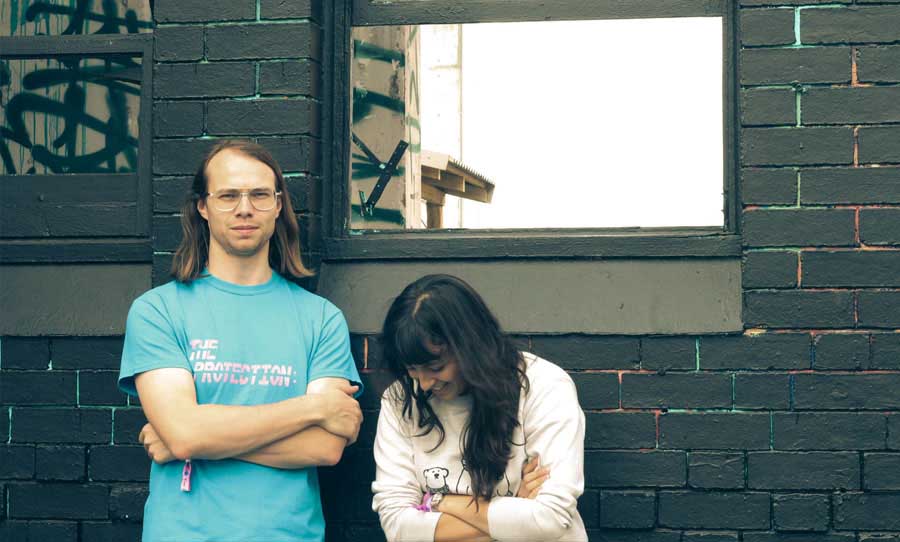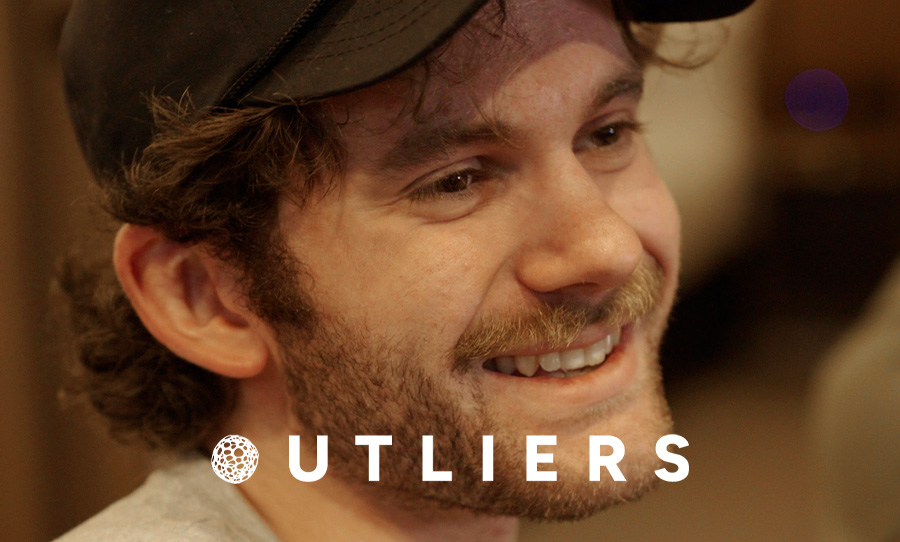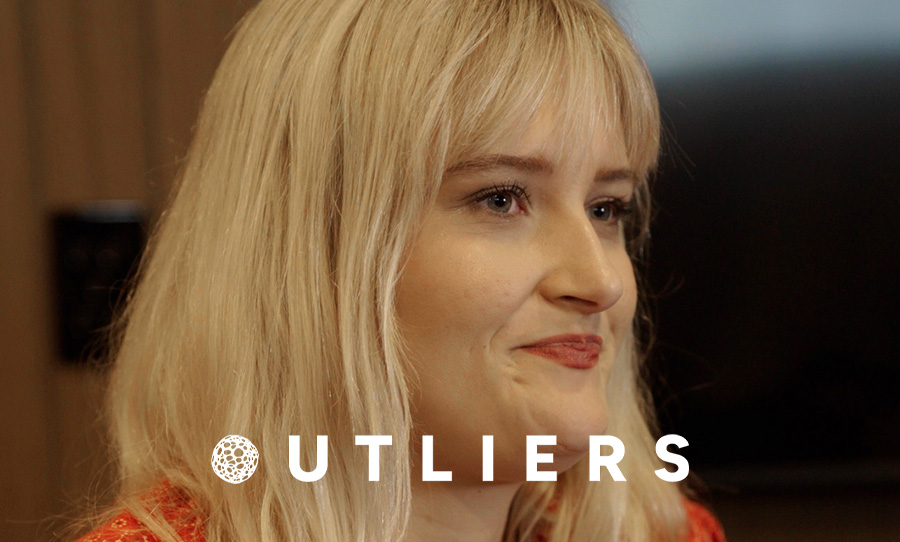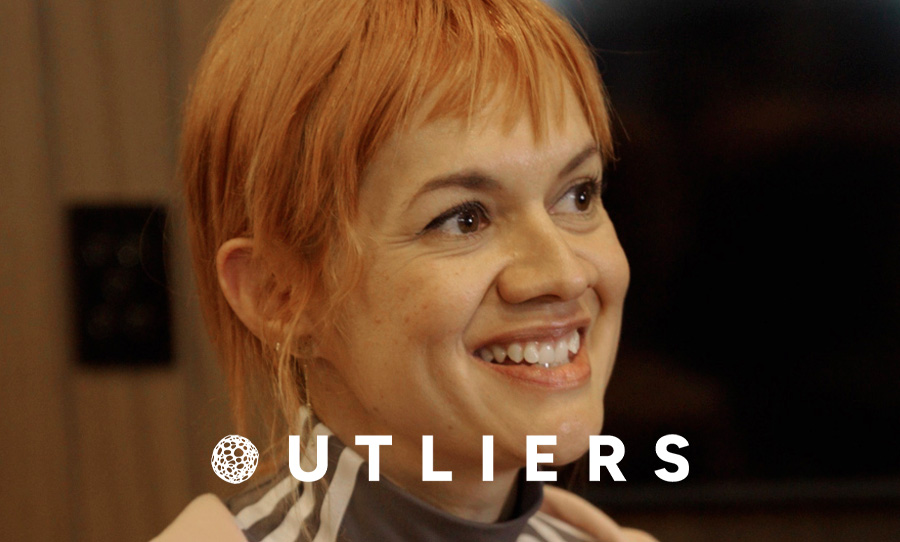Since the release of their debut album Future Me Hates Me, The Beths have been the band on everybody’s lips. The record earned praised from the world’s biggest tastemakers and has netted them more tour dates than you can count – which isn’t bad for an indie band out of Auckland.
On the first day of BIGSOUND 2018, we sat down with Elizabeth Stokes and Jonathan Pearce from the band. Here’s what went on.
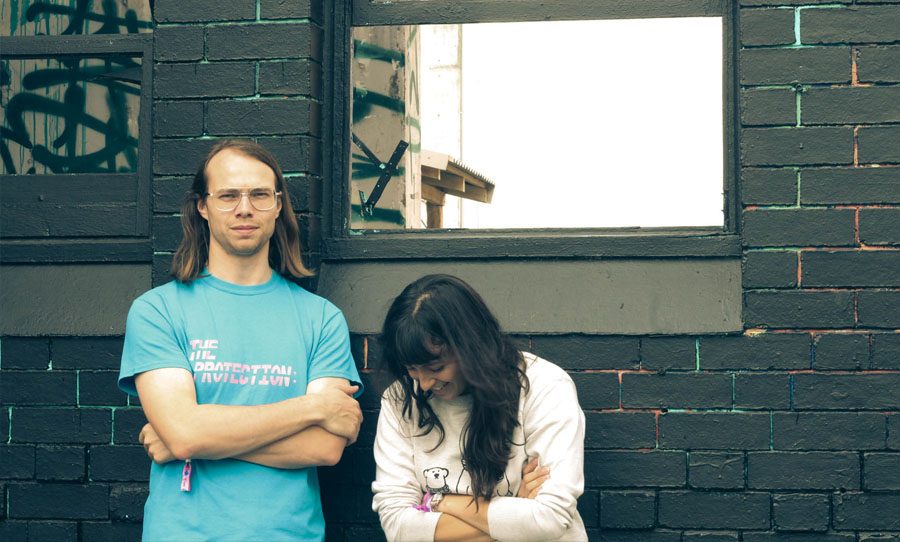
At BIGSOUND 2018 we caught up with The Beths to chat rituals, reluctance, and the baffling amount of pianos in New Zealand.
HAPPY: I’ve recently done a bit of a deep dive into New Zealand music because Happy are doing a week of NZ content later this month – it’s blowing all of our minds. Being over there yourselves do you get a sense that something special is going on, or is it business as usual?
ELIZABETH: It’s hard to say at the moment, I mean I haven’t personally had much context for it. There seems like there’s great music now and as long as I’ve been in the scene there’s been great music and bands. I also kind of assumed it’s like that everywhere, obviously going on tour you see great bands everywhere. But there is something special about Auckland, and Wellington at least, they’re the two scenes I know in New Zealand.
JONATHAN: There’s little scenes. Auckland’s got a good thing going for guitar music, I think. A bunch of other music that I don’t really listen to too much seems to happen in Auckland, and then Littleton and Christchurch and the South Island seem to have a folk thing going on. I think K Road is pretty special. I don’t think there’s too many K Road’s around in the world.
HAPPY: I was going to ask about K Road, I’m not really clued in but I keep hearing it mentioned. It’s a street, but it’s also where you guys recorded?
JONATHAN: Yeah there’s some venues, you know there’s a venue that everyone can play their first gig at, there’s a smaller venue that everyone can play at very often while you’re… ok, or something. Then there’s bigger venues.
ELIZABETH: But maybe that’s not unique…
HAPPY: Maybe the scene around it then?
ELIZABETH: Auckland is big, it’s a metropolis but it’s small enough that there’s only one K Road, there’s only one street that’s got all of the venues and things on it. There’s not like, another suburb that’s got its own big scene.
JONATHAN: That’s true.
ELIZABETH: Some of the bigger suburbs have their own venues but it’s really all centralised. So all of the artists, and not just the people making guitar music, it all just seems to centre around this one place.
JONATHAN: I think there’s also a bit of a hate for the sprawl of Auckland, it’s a very suburban city so in the art community a lot of people are like ‘this is not what we want our community to be’. They don’t want to commute an hour a day, or something like that, so people quite strongly want to live central. It seems a lot of the artistic community want to do that and decide to do that themselves.
HAPPY: Do you think there’s something about life in New Zealand or Auckland in particular that’s inspiring this guitar music thing?
ELIZABETH: It’s hard to say.
HAPPY: Bigger question, that one.
JONATHAN: One thing that Beth always says is how many pianos there are in New Zealand.
HAPPY: Like a high concentration of pianos?
JONATHAN: Yeah, there’s so many pianos and New Zealand has never manufactured pianos. So every piano in New Zealand has been imported to New Zealand, and there’s pianos flippin’ everywhere. That is baffling to me. It’s less baffling that there’s guitars around the place, and if you wanted to learn guitar it’s not that difficult…
HAPPY: You’re talking about proper, standing pianos?
JONATHAN: Yeah. That’s more mysterious to me. So I don’t have an insight into what makes New Zealand guitar-prone, but we’ve got enough pianos, so why not guitars?
HAPPY: I don’t think anyone out there has done a study of pianos per capita, but maybe they should.
JONATHAN: I’d love to do a piano census of New Zealand. It would be cool to learn that there were 100,000 pianos in New Zealand or something. And then to think that every one of them came over in a ship and was manufactured in Japan or England, or something like that.
HAPPY: I like it.
ELIZABETH: So why is guitar music popular?
JONATHAN: Why is guitar music popular? I don’t know. I know more about pianos. What do you think?
ELIZABETH: I don’t know, I wonder. Like, New Zealand loves pop music.
HAPPY: Pop is the other thing we sort of see from a distance, coming from over there.
ELIZABETH: That’s interesting to hear. I haven’t really fully fleshed out this thought.
JONATHAN: We’ve had this debate with people all around the place, and I think people are observing that something, but we can’t explain it. We’ve tried every time. We don’t have a thesis on the subject.
HAPPY: Onto the album then. Listening to Future Me Hates Me, the theme I kept getting, and tell me if this is dumb, was reluctance.
ELIZABETH: That sounds right. Reluctance and self-doubt kind of tie into each other, before making any decision I think. Everyone I know around me is quite anxious about decisions you’re going to make… all decisions. That’s a pretty fair reading, I wasn’t trying to go for a theme but obviously that’s just a theme in my life, I suppose.
HAPPY: The thing about reluctance, it kind of has this innate conflict in that recording a song is really a way of overcoming reluctance or anxiety. Was it cathartic for you to record in that way?
ELIZABETH: I suppose so. Cathartic kind of implies that after writing the song, I felt better about whatever that situation was, which isn’t necessarily true. I feel like maybe it’s more a representation of what was happening at the time. I does feel better to write when I’m feeling bummed out… which isn’t super unique.
HAPPY: Well there’s stuff about being happy too! Which is something people tend to focus on less. Also just as powerful, I think.
ELIZABETH: Totally.
HAPPY: Has releasing the album and seeing the positive reaction to it opened the doors to any other topics? Something you may not have been comfortable writing about before?
ELIZABETH: Maybe. I do notice that a lot of the time when somebody reads into a song, the default way to read into it is as a romantic relationship. I think a lot of my songs are about relationships, but not necessarily romantic ones. I don’t know, when you’re my age your friends are kind of family as well and whatever’s going on in their life, it feels like it affects you really strongly. It’s made me think about that a lot, you don’t necessarily always want to be writing about… boys.
HAPPY: That’s really interesting, I’ve never considered that kind of default reaction.
ELIZABETH: Yeah, because in my mind I can always remember where I was when I wrote them, I can remember exactly where I was when I wrote something. And often when people are writing about it, they’ll say ‘oh, this song is about a breakup’, but no it wasn’t. But that’s fine, they’ve interpreted it in that way.
HAPPY: So are you seeing the album in a different way, talking to people like myself who come up with their own thesis?
ELIZABETH: I don’t know, it’s hard to see it a different way to the way, when I listen to it I remember A; writing it and where I was when I wrote it and B; where we were when we recorded the parts, and where we were when we recorded the vocal parts, and how I was feeling that day. There’s already so much of my own baggage that it would be really hard for something else to change it.
JONATHAN: (To Elizabeth) I guess it’s been really interesting for me hearing you talk more about it, but I feel like I already… I don’t know, I didn’t need any reaction from outside to deepen my appreciation for your songwriting. But then hearing you talk about it is really interesting, and I think I also am pretty good at listening to things a lot of times, as a recording engineer that comes in pretty handy, and part of that is short term memory or something like that. I’d not listened to the album for a while, and then listened to it again in recent times and heard different things. Seems like that must have been accidentally successful now because it’s new to me. That was a happy accident.
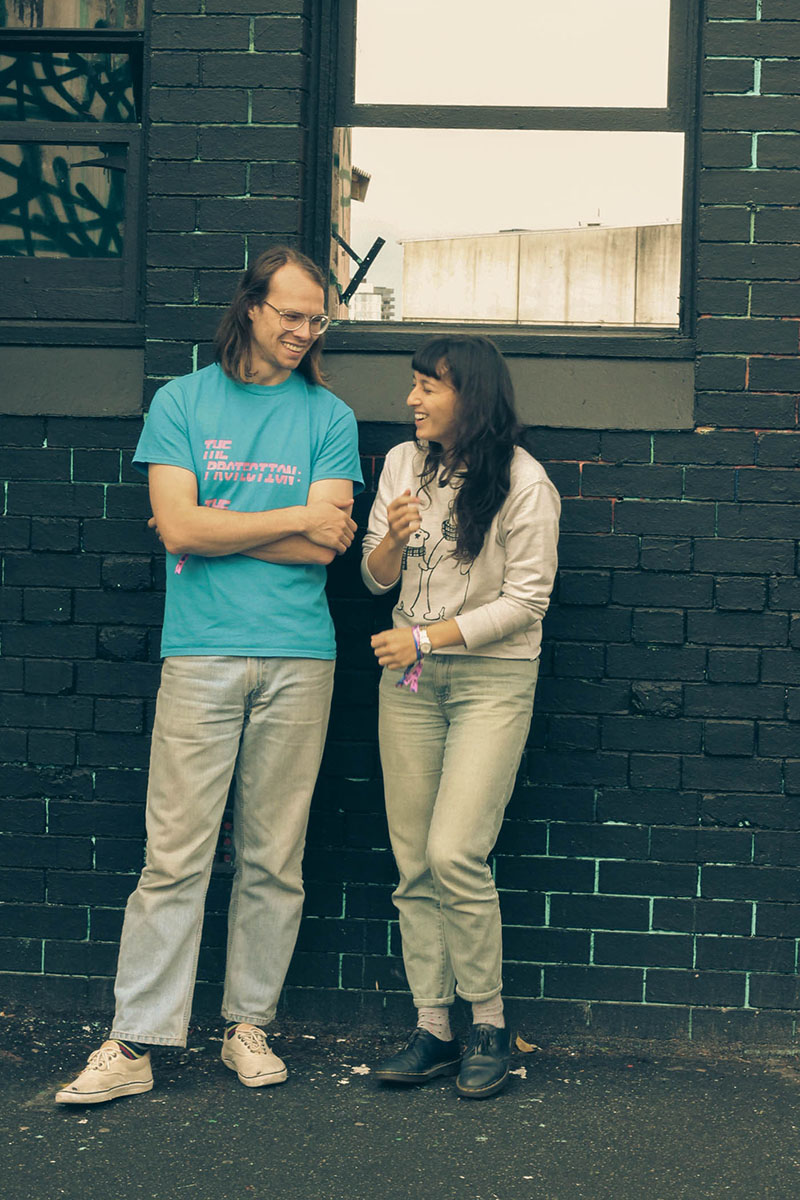
HAPPY: Beth you seem to be someone who spends a lot of time writing, or writes when you really need to. I like this question because I always get a different answer, but do you have any writing rituals? Like a specific pen or notepad that you bring everywhere?
ELIZABETH: Yeah. So when I first started the band I heard this thing that there’s this gap between your taste and your ability, and I knew I wanted to start the band and so I knew that I had to write a lot, and like if I wrote a hundred songs then at least five of them might be good, sort of thing. So I wrote way more then than I do now, so I do wish I was doing it more strictly, because I thought that was better. The more you write, the better. In order to help with that I would buy a nice notebooks, like Moleskines. Maybe we’ll get a sponsorship about it. Or these pens from kikki. K, the gel pens, I like the action, they just write really nicely. Because it’s a physical thing too, I write in a notebook not a computer and if it’s something that feels satisfying and feels good, I was much more likely to do it. I still do that, and I still use the same pens, my systems are much more scattered though.
HAPPY: Yeah, sometimes you just have to make it work with whatever.
ELIZABETH: Yeah yeah, I still like using those pens though.
HAPPY: And how about with writing music? For instance, I know someone who always plays the same record when he sets up his studio.
JONATHAN: Man, I might adopt that one, I do like that.
HAPPY: You really have to pick the right record, there. If you’re going to commit.
JONATHAN: Absolutely.
ELIZABETH: We could do one for a year, maybe?
JONATHAN: I’ll work on it. I think we didn’t really have too many rituals when we would do band practices, or arrange the songs, or record them or whatever. I think we could work on that, we do want to work on that. We want ourselves and the people around us to be happy and stimulated, and I think it’s good to have systems around that.
HAPPY: Sweet.
JONATHAN: I think The Beths, and working on that album, was a project of convenience for a long time, we didn’t really give it our central focus for a long time. So most of those sessions and all of the practices really was just like oh, Monday night seems to be free for everybody, so sweet we’ll do a Monday night. Everyone shows up, plugs in their instruments and plays, and starts debating with each other about parts and things like that. It was pretty unscripted and unsystematic.
HAPPY: That can be a system of its own sometimes.
JONATHAN: Yeah, yeah. A bit of controlled chaos can be really good, that’s true.
HAPPY: Well awesome, I think that’s about it… anything else while we’re on record?
JONATHAN: It’s funny, it’s surprising how not often I’ve been asked that, like ‘do you guys have anything else to talk about’. I figure it’s an opportunity for like, the record label executive to tap you on the shoulder and say ‘you really should be talking about this thing’. But we don’t really have that voice in our head so in lieu of that can we just say – dogs should vote.
HAPPY: Totally onboard with that. Love it.
For the rest of the year The Beths will play shows throughout New Zealand, America, Europe and the UK. Grab a full list of their tour dates here.
